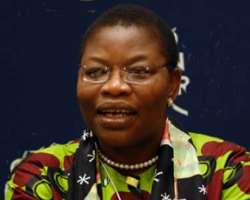N1tn spent on N'Assembly members in eight years - Ezekwesili

Nigeria spent over N1tn on the National Assembly members in the last eight years, according to a former Minister of Education, Mrs Oby Ezekwesili.
'Since 2005, the National Assembly members alone have been allocated N1tr,''Ezekwesili said.
Ezekwesili, a former World Bank vice president for Africa, in a keynote address delivered during one-day dialogue session on the 'Cost of governance in Nigeria, ' said that banks earned N699bn as interests last year on loans secured by the government.
She was uncomfortable that '82 per cent of Nigeria's budgetary cost goes for recurrent expenditure.'
To buttress her claim that much was being spent servicing those in government, she said that ' a research conducted in the United Kingdom identified Nigerian legislators as being the highest paid in the world.'
Ezekwesili, who was also a former minister of Solid Mineral in Nigeria, challenged civil society groups to demand a mini-national dialogue that centres on good governance and the the release of the Steve Oronsaye report on Rationalisation and Restructuring of Federal Parastatals, Commissions and Agencies.
'There should be effective demand by civil society groups of the report of the Oronsaye report. You should also demand a mini-national transparent dialogue because it touches on the heart of good governance', she stated.
She also pointed out that one of the greatest mistakes of the Olusegun Obasanjo administration under which she served twice as a minister was that Nigeria delved into democracy without necessarily doing away with a military mindset.
'There is a drawback to the military era. One major mistake of the government under which I served was that we simply got into democracy and did not spend reasonable time getting every citizen; every leader and every institution to do away with militaristic ethos and principles from their minds,' Ezekwesili added.
According to her, the social dilemma which the country currently finds itself would be overcome if stakeholders, especially lawmakers, consider part-time legislation as a means of bringing down the cost of governance.
She said part-time lawmaking would ensure that the right people got into governance.
'Things will improve through part-time legislation. It will also reduce the number of people who will go into the National Assembly. You must have means of livelihood so that you won't have to depend on public funds, 'she said.
The former minister argued that Nigeria's problem was not the system of governance but more of the kind of people managing it.
Ezekwesili said while other countries were moving forward technologically, Nigeria was trapped by oil, a natural resource which it loses a revenue of about $1.6bn annually.
She said, 'When I was in government, I was totally debating public policies. We must debate public policies as a nation because if we don't do so, we will make silly mistakes because we don't involve the stakeholders. So policy debates must be encouraged.
'The culture of personalising policy dialogues must stop. When you have a problem, you don't leave the problem and begin to chase other matters.
'I feel sorry for any person who is fairly okay in this nation and doesn't care about the poor because there will be an implosion. Whatever treatment that is given to the poor and vulnerable in the society must matter to everybody because except we have social inclusion in the society, we stand the danger of implosion. This has happened in other countries which ignored the vulnerable people.'
In his speech, the Executive Director of CISLAC, Ibrahim Rafsanjani, condemned the cost of governance in Nigeria.
He said, 'There is recent media report of our National Assembly members being the highest paid in the world. The size of the cabinet at the executive level, including the retinue of superfluous aides and special assistants, is alarming. The fact that the 10 planes in the Presidential fleet gulp N9.08bn annually is something that must be looked into.'
